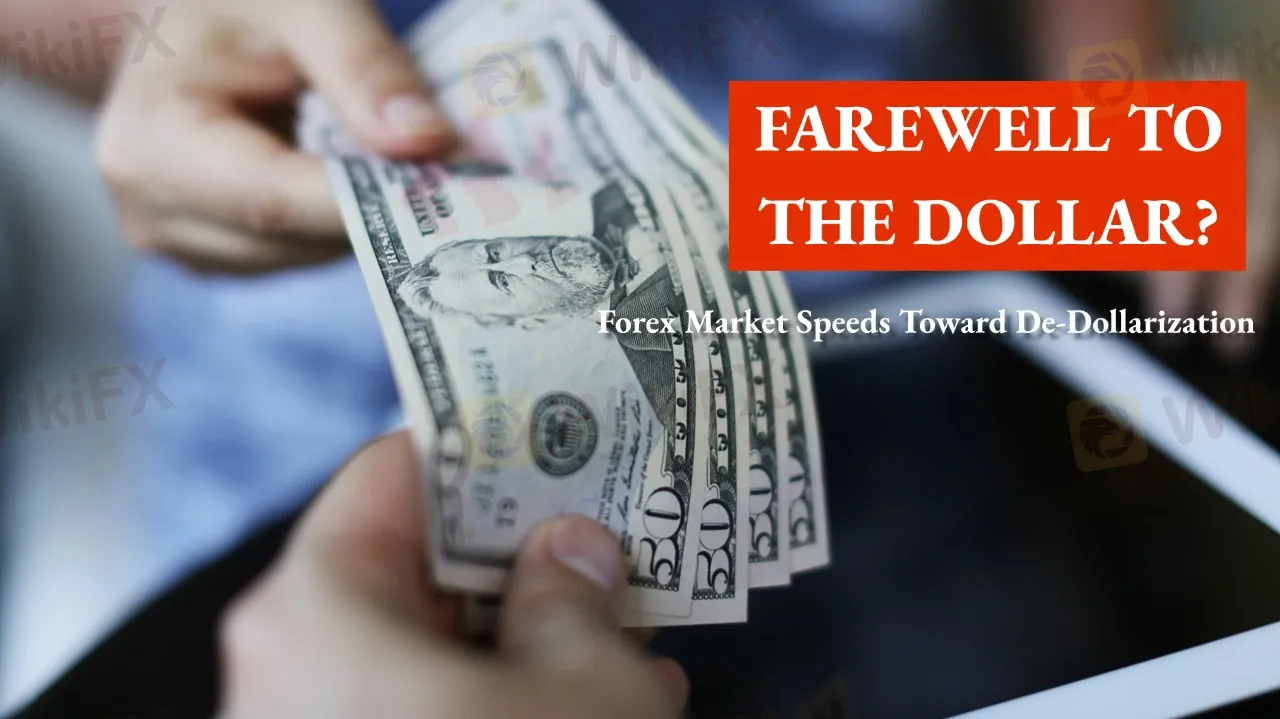简体中文
繁體中文
English
Pусский
日本語
ภาษาไทย
Tiếng Việt
Bahasa Indonesia
Español
हिन्दी
Filippiiniläinen
Français
Deutsch
Português
Türkçe
한국어
العربية
Farewell to the Dollar? Forex Market Speeds Toward De-Dollarization
Abstract:The dollar is losing its dominance? The forex market is witnessing a rapid shift toward de-dollarization, sparking serious investor attention.

Recently, the U.S. dollar has been under significant selling pressure in the forex market. Not only has it weakened against major currencies, but U.S. assets across the board—stocks, bonds, and the dollar itself—are facing simultaneous outflows.
Unlike typical crises where investors rush to hold dollars and U.S. Treasuries, the current trend shows them actively avoiding U.S. assets. This signals a potential erosion of long-held confidence in the dollar as a safe haven.
Mounting Challenges Push De-Dollarization into High Gear
Analysts from Deutsche Bank point out that the dollar is facing an unprecedented trust issue. On one hand, global demand for dollar-denominated assets is shrinking.
On the other, rising trade tensions with major economies have brought currency issues into the spotlight, further undermining market confidence.
What's more, concerns about the political use of dollar liquidity are prompting central banks and investors worldwide to reduce their reliance on the dollar. This de-dollarization trend is no longer theoretical—its accelerating in real time.
Official institutions are considering cutting back on U.S. Treasuries, and global contracts are increasingly shifting away from being dollar-denominated.
In this shifting environment, forex investors need to sharpen their risk radar. Diversifying away from dollar exposure is becoming a prudent strategy. Currencies like the euro, yen, and even the yuan are gaining attention as potential alternatives.
At the same time, traditional safe-haven assets like gold may see renewed demand, especially as concerns over global liquidity risks intensify.
Investors should also prepare for heightened volatility. Short-term trading strategies must be more sensitive to event-driven movements and policy signals. In the long term, it remains to be seen whether the dollar will lose its global dominance—but the current momentum toward de-dollarization is undeniable, and investors cant afford to ignore it.

Disclaimer:
The views in this article only represent the author's personal views, and do not constitute investment advice on this platform. This platform does not guarantee the accuracy, completeness and timeliness of the information in the article, and will not be liable for any loss caused by the use of or reliance on the information in the article.
Read more

SFC Issues Restriction Notice to GA (Int’l) Capital Management Limited Over Regulatory Concerns
The Securities and Futures Commission (SFC) of Hong Kong has issued a restriction notice against GA (Int’l) Capital Management Limited (GCML), raising serious concerns about the firm’s integrity, reliability, and competence in carrying out its regulated activities.

Nonfarm Data Lifts Market Sentiment, U.S. Stocks Rebound Strongly
U.S. nonfarm payrolls for May slightly exceeded expectations, stabilizing investor sentiment and easing fears of a hard landing. This upbeat data sent U.S. equities broadly higher, led by tech stocks, with the Dow and S&P 500 posting significant gains. However, behind the optimism lies a fresh round of market debate over the Federal Reserve’s rate path, with uncertainty around inflation and interest rates remaining a key risk ahead.

OctaFX Flagged by Malaysian Authorities
OctaFX has been officially listed on warning lists by both Bank Negara Malaysia (BNM) and the Securities Commission Malaysia (SC). These alerts raise serious concerns about the broker’s status and whether it is legally allowed to operate in Malaysia.

TradingPRO: A Closer Look at Its Licences
In an industry where safety and transparency are essential, the regulatory status of online brokers has never been more important. For traders seeking to protect their capital, ensuring that a platform operates under recognised and stringent oversight can make all the difference. Keep reading to learn more about TradingPRO and its licenses.
WikiFX Broker
Latest News
OctaFX Flagged by Malaysian Authorities
IronFX Broker Review 2025: A Comprehensive Analysis of Trustworthiness and Performance
Nonfarm Data Lifts Market Sentiment, U.S. Stocks Rebound Strongly
Why Your Worst Enemy in Trading Might Be You
Errante Broker Review
Exnova Forex Broker Scam: Blocked Accounts, Lost Funds
Currency Calculator


